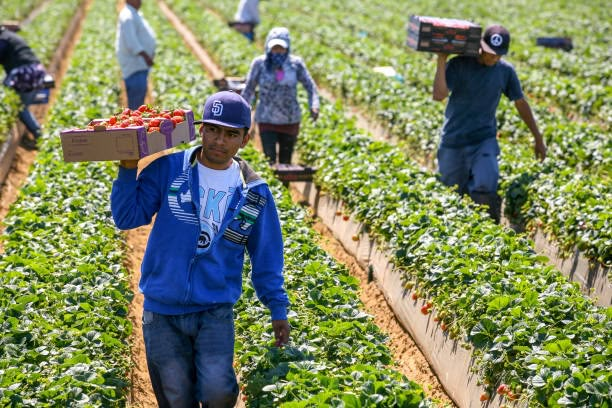Canada’s vast, scenic farmlands and thriving agricultural industry have opened up tremendous opportunities for newcomers—even if you have no previous experience. From fruit picking in sun‑drenched orchards to various farm work roles in diverse regions, employers across Canada welcome hard‑working individuals and often provide visa support to help you get started. In this comprehensive guide, you will learn everything you need to know about working on Canadian farms, the visa pathways available, and what to expect from the job environment.
With Canada’s growing reliance on seasonal and temporary workers, this article will empower you with practical insights and actionable steps to secure your position, even if you’re new to the industry. Whether you’re seeking short‑term work, planning to eventually settle in Canada, or simply looking for an adventure, this guide is your one‑stop resource to launch your agricultural career in Canada.
Answer Questions & Apply
Results
#1. Do you have any work experience?
#2. Do you have a valid international passport?
#3. What type of opportunity are you most interested in?
#4. What is your current country of residence?
#5. What is your highest level of education?
1. Why Consider Farm Work in Canada?
1.1 A Booming Agricultural Industry
Canada is known for its expansive landscapes and diverse climates that create ideal growing conditions for a wide range of fruits and vegetables. The agricultural industry contributes billions to the national economy every year and remains one of the fastest‑growing sectors. With an increasing demand for fresh produce and a shortage of domestic labor, Canadian farms actively seek out international workers to fill these roles.
Many farms offer structured on‑the‑job training programs that allow even complete beginners to become efficient, skilled workers in a short period. Moreover, working on a farm offers an immersive experience in rural life and a chance to build lifelong relationships with colleagues from diverse backgrounds.
1.2 Entry‑Level Opportunities Without Experience
One of the most appealing aspects of fruit picking and farm work is that employers typically do not require previous experience. What matters most is your enthusiasm, willingness to learn, and ability to work hard under variable weather conditions. Once you secure a job, most employers offer a brief training period to get you accustomed to the work environment and safety protocols.
For instance, many roles offer training that covers everything from how to pick delicate fruits without causing damage, to the efficient use of sorting and packing equipment. This approach makes it easier for you to transition into the role and quickly build a reputation as a reliable worker.
Integration Note: Compare your new journey to those exploring other entry‑level roles like Delivery Driver Jobs with International Visa Sponsorship, where similar entry‑level training programs help launch successful careers.
1.3 A Gateway to Canadian Immigration
Working on Canadian farms is not only a job opportunity—it can also be a pathway to long‑term residency. Several visa programs, such as the Seasonal Agricultural Worker Program (SAWP) and the Temporary Foreign Worker Program (TFWP), offer work permits that can sometimes lead to permanent residency. Through these programs, you can start building your Canadian experience, network with potential employers, and even qualify for Provincial Nominee Programs (PNPs) if you decide to settle down permanently.
2. Understanding the Visa Pathways
2.1 Seasonal Agricultural Worker Program (SAWP)
The Seasonal Agricultural Worker Program (SAWP) allows Canadian farms to recruit temporary foreign workers from designated countries during peak harvest seasons. This program not only supports the Canadian agricultural industry by meeting labor demands but also offers workers a unique opportunity to experience Canada.
- Duration: Up to 8 months per season
- Benefits: Visa support, access to on‑site housing, and training programs
2.2 Temporary Foreign Worker Program (TFWP)
For farms that fall outside the SAWP framework, the Temporary Foreign Worker Program (TFWP) is the alternative. Employers must first obtain a Labour Market Impact Assessment (LMIA) to prove that hiring a foreign worker will not negatively impact the domestic labor market. Once approved, you can obtain a work permit that is usually tied to a specific employer.
- Duration: Often issued on a renewable annual basis
- Benefits: Continued work permits and a pathway to permanent residency through additional programs
Integration Note: If you’re comparing different visa pathways, you might also explore Top 10 Easiest Jobs with Visa Sponsorship for Newcomers in Canada to see how farm work opportunities stack up against other sponsored roles in Canada.
2.3 Other Visa & Sponsorship Options
Apart from the major programs, some farms and regional initiatives offer additional visa pathways. For instance, certain provinces have started pilot programs to integrate temporary workers into the permanent labor force, giving you even more opportunities to secure long‑term residency.
3. Finding Farm Work & Fruit Picking Jobs
3.1 Online Job Portals and Recruitment Agencies
The internet has revolutionized job hunting, and finding farm work in Canada is no exception. There are several job portals dedicated to agricultural and seasonal work that list available positions with detailed descriptions, requirements, and employer reviews.
When browsing these portals, pay close attention to details such as work duration, living arrangements, and wage expectations. Many job posts also highlight whether visa support is provided, which can be a crucial deciding factor for international applicants.
3.2 Direct Applications and Networking
Smaller, family‑run farms might not always advertise their vacancies online. In these cases, direct applications can be very effective. Prepare a simple yet professional resume that emphasizes your work ethic, reliability, and willingness to learn. A personalized cover letter that explains why you’re interested in farm work can set you apart from other candidates.
Local job fairs, community events, and even social media groups dedicated to agriculture are also excellent venues for networking. By connecting directly with employers, you can learn more about the work environment and any additional benefits that might not be mentioned in online postings.
Integration Note: In your job search, you might also find information on Affordable Temporary Housing Options for Visa Holders useful, as many farms offer on‑site or nearby accommodations.
4. Preparing Your Application Materials
4.1 Crafting a Resume for Farm Work
Your resume does not need to be extensive—especially if you’re applying for entry‑level positions. However, it should clearly state your contact information, a brief personal summary, and any relevant skills or experiences. Even if you have no direct experience, highlighting transferable skills such as teamwork, punctuality, and physical stamina can make a big difference.
Resume Tips:
- Keep it concise: One page is often enough.
- Emphasize reliability: Mention any volunteer work or community projects.
- Highlight adaptability: Farm work is dynamic, and employers value flexibility.
4.2 Writing an Effective Cover Letter
A well‑crafted cover letter is your chance to show your personality and eagerness to work. Explain why you’re interested in the agricultural sector and how your personal qualities make you a good fit for a physically demanding and seasonal job. Be sure to mention your ability to learn quickly and adapt to new environments.
Integration Note: If you’re planning on furthering your career beyond farm work, you might want to read Kitchen Porter & Dishwasher Jobs Offering Visa Support to understand how entry‑level roles in different sectors value similar attributes.
4.3 Gathering Supporting Documents
For your visa application and job process, ensure you have the following:
- A valid passport with at least six months’ validity beyond your intended stay
- Visa application documents such as invitation letters or work permits
- References or letters of recommendation if available
- Proof of funds or accommodation arrangements if required by the visa program
5. What to Expect on the Job
5.1 Daily Duties on the Farm
Once you land a job, your day‑to‑day activities can vary depending on the season, location, and type of farm. Common tasks include:
- Fruit Picking: Gently picking fruits such as apples, cherries, and berries while ensuring they are not damaged.
- Sorting and Packing: Once harvested, fruits are sorted according to quality and size before being packed for market.
- Equipment Operation: You may need to learn how to operate basic farm machinery such as conveyor belts or pallet jacks.
- Greenhouse Maintenance: In some cases, tasks may extend to greenhouse upkeep, including watering, weeding, and pest control.
5.2 Physical and Mental Demands
Farm work is inherently physical. It requires stamina, strength, and sometimes long hours in varying weather conditions. You should be prepared for:
- Long Days: Expect shifts ranging from 8 to 10 hours during peak seasons.
- Variable Weather: Work outdoors means dealing with heat, rain, or even cold, depending on the season.
- Team Environment: Effective communication and cooperation with fellow workers are essential for maintaining efficiency and morale.
5.3 Benefits Beyond the Paycheck
While competitive wages are a major draw, the benefits of farm work extend well beyond your monthly income:
- On‑Site Housing: Many farms offer shared or dormitory‑style housing, often included in your compensation package.
- Cultural Immersion: Experience rural Canadian life, meet locals, and learn about regional traditions.
- Pathway to Residency: With programs like SAWP and TFWP, your work experience can serve as a stepping‑stone to permanent residency.
Integration Note: This blend of work and lifestyle is somewhat comparable to opportunities like Chef and Cook Positions with Visa Sponsorship (Apply Today!), where not only are you earning a competitive wage, but you’re also immersing yourself in a new culture.
6. Detailed Breakdown: Regions, Jobs, and Salaries
Below are three tables that provide a detailed breakdown of farm work opportunities across Canada. These tables are designed to help you quickly compare job opportunities and wage expectations based on location and job type.
6.1 Table 1: Regional Breakdown of Farm Work Opportunities
| Province | Peak Season | Common Crops | Visa Program |
|---|---|---|---|
| British Columbia | May – October | Apples, Cherries, Berries | SAWP, TFWP |
| Ontario | June – September | Berries, Vegetables | SAWP, TFWP |
| Quebec | July – October | Blueberries, Strawberries | TFWP |
| Alberta | June – September | Potatoes, Onions, Mixed Produce | TFWP |
| Nova Scotia | July – September | Apples, Cranberries | SAWP, TFWP |
This table highlights the key provinces, their peak seasons, the types of crops harvested, and the visa programs available to support foreign workers. Each region has its unique offerings, so choose the one that best matches your preferred climate and work style.
6.2 Table 2: Top Fruit Picker Jobs & Salary Expectations
| Job Title (with Link) | Salary Expectation (CAD) |
|---|---|
| Fruit Picker – Apple Orchards, BC | 15.00 – 18.00 per hour |
| Berry Harvester – Ontario Farms | 16.50 – 19.00 per hour |
| Cherry Picker – Okanagan Valley | 17.00 – 20.00 per hour |
| Greenhouse Worker – Quebec | 14.50 – 17.50 per hour |
This job‑specific table shows some of the top fruit picking positions available, complete with backlinks to learn more about each role. Use these links to get detailed information on job requirements, application processes, and additional benefits.
6.3 Table 3: Related Visa‑Supported Roles & Salary Expectations
| Job Title (with Link) | Salary Expectation (CAD) |
|---|---|
| Kitchen Porter & Dishwasher Jobs Offering Visa Support | 14.00 – 16.00 per hour |
| Tailoring & Seamstress Jobs Offering Visa Sponsorship | 18.00 – 22.00 per hour |
| Chef and Cook Positions with Visa Sponsorship (Apply Today!) | 20.00 – 25.00 per hour |
| Delivery Driver Jobs with International Visa Sponsorship | 17.00 – 21.00 per hour |
This table provides an overview of other visa‑supported positions that may interest you if you’re considering alternative fields or looking to diversify your skill set in Canada.
7. The Cost of Living and Accommodation Options
7.1 Living Expenses in Rural Canada
While urban centers like Toronto and Vancouver are known for their high living costs, rural areas—especially those surrounding agricultural regions—are much more affordable. On‑site accommodations are often provided by employers, which can significantly lower your living expenses. Typically, you can expect:
- Rent: CAD 400–700 per month for shared housing
- Utilities & Internet: Often bundled with your accommodation package
- Food & Transportation: Approximately CAD 200–300 per month
7.2 Finding Temporary Housing
For workers who need temporary arrangements before settling into a long‑term living situation, there are many options available:
- On‑Site Housing: Many farms include dormitory‑style or shared housing.
- Local Rentals: Affordable rooms or apartments can often be found near major farms.
- Hostels and Short‑Term Rentals: Some regions have dedicated short‑term housing options geared towards seasonal workers.
Integration Note: Explore details on Affordable Temporary Housing Options for Visa Holders if you’re in need of short‑term accommodation solutions.
7.3 Managing Finances
Budgeting is essential when working seasonally. While wages in farm work can be competitive, you’ll want to manage your earnings carefully, particularly if you’re planning to save for future visa applications or further education. Many workers open local bank accounts to simplify money management and take advantage of local financial services.
8. Long‑Term Opportunities and Career Progression
8.1 Transitioning from Seasonal Work to Permanent Residency
Many workers start in seasonal roles with the goal of eventually settling in Canada. Programs like the TFWP often allow for extensions or transitions to permanent residency. As you accumulate work experience and build a network, you may be eligible to apply for Provincial Nominee Programs (PNPs) that recognize your contribution to the local economy.
8.2 Building a Career Beyond the Fields
Farm work not only provides an income but also develops skills that are highly valued in other industries. The discipline, teamwork, and adaptability you acquire on the job are assets that can open doors to further career opportunities. For instance, if you decide to pursue managerial roles or shift into food processing, your hands‑on experience is a strong foundation for advancement.
Integration Note: For those interested in exploring diverse career pathways, you might find it beneficial to read about Global Visa-Sponsored Electrical Engineering Careers, which similarly emphasize the value of practical experience leading to long‑term career growth.
8.3 Further Education and Skill Development
If you’re considering additional education while working, many Canadian provinces offer part‑time courses tailored for adult learners in agriculture. Balancing work with studies not only increases your qualifications but may also improve your visa status. Moreover, some workers take advantage of scholarship opportunities, such as those described in $40,000+ Scholarships in Canada for International Students (Apply Now!), to fund further training and education.
9. Navigating the Application and Interview Process
9.1 Online Applications
The first step is to browse job portals, agency websites, and farm listings to identify positions that match your skills and interests. When applying online:
- Tailor your resume: Use keywords like “farm work,” “fruit picking,” and “seasonal worker.”
- Attach a concise cover letter: Briefly explain why you’re interested in the role and highlight your work ethic.
- Follow instructions carefully: Some employers require additional documents, such as a copy of your passport or previous references.
9.2 Interviews and On‑Site Assessments
If your application is shortlisted, you may be invited for an interview—either via video call or in person. Interviews for farm work roles are typically straightforward, focusing on your physical ability to handle the work and your willingness to learn. Sometimes, you may be asked to participate in a short practical test to evaluate your suitability for the job.
Integration Note: When interviewing, treat the process much like Tailoring & Seamstress Jobs Offering Visa Sponsorship, where professionalism and a willingness to learn can set you apart from other candidates.
9.3 Post‑Interview Follow‑Up
After your interview, always send a thank‑you email. A brief note expressing your gratitude for the opportunity and reiterating your interest in the role can leave a positive impression and help you stand out in the selection process.
10. Health, Safety, and Worker Rights
10.1 Health and Safety Protocols
Farm work is physically demanding, so safety is paramount. Employers typically provide:
- Protective Gear: Gloves, hats, boots, and sometimes sunscreen.
- Safety Training: Instructions on using machinery safely and handling hazardous materials.
- Emergency Procedures: Protocols in case of injuries or extreme weather conditions.
Workers should also take personal steps to maintain their well‑being:
- Stay Hydrated: Always have water on hand during long shifts.
- Follow Safety Guidelines: Adhere to all instructions provided by your employer.
- Report Hazards: Immediately inform your supervisor if you notice any unsafe conditions.
10.2 Workers’ Rights and Legal Support
As a foreign worker, it is important to know your rights. Canadian labor laws protect workers against exploitation and unsafe working conditions. Many provinces have labor centers or worker advocacy groups that offer free advice and legal support. If you ever feel that your rights are not being respected, do not hesitate to seek assistance.
Integration Note: Similar protection and support can be found in other fields, such as Work & Stay: Top Countries Offering Clear Paths to Residency with Visa Sponsorship, where worker rights are an essential component of the employment process.
11. Success Stories: Real‑World Experiences
11.1 Inspiring Journeys from the Fields
Many individuals have successfully transitioned from seasonal farm work to permanent life in Canada. Consider the story of Carlos, a fruit picker from Central America who began his journey with no previous experience. With determination, Carlos embraced the training offered by his employer, steadily advancing from basic fruit picking to a supervisory role on the farm. Today, he is not only a valued team member but is also on track to apply for permanent residency.
11.2 Community and Networking Benefits
Farm work provides more than just income—it builds a community. Workers often form strong bonds, sharing tips about the best local eateries, navigating public transportation, and even exploring Canadian culture during off‑hours. This supportive environment is crucial, especially for newcomers adapting to a new country.
Integration Note: Just as the community in farm work supports growth, you might find further inspiration by exploring Step-by-Step Guide to the UK Marriage Visa in 2025 for those interested in how personal relationships can also influence successful immigration stories.
11.3 Lessons Learned and Advice
Successful workers emphasize the importance of being open to new experiences and continuously learning. Whether it’s understanding the nuances of crop cycles or simply learning to appreciate Canadian weather, every experience adds value. Keep an open mind, be patient with the learning process, and always strive to do your best.
12. Balancing Work, Life, and Future Planning
12.1 Life on a Canadian Farm
Living and working on a Canadian farm offers a unique lifestyle that balances hard work with a peaceful, rural setting. You’ll wake up to breathtaking views of sprawling fields and enjoy a slower pace of life compared to the hustle of the cities. At the same time, you’ll build practical skills that are highly valued in many industries.
12.2 Planning for the Future
Many farm workers use their seasonal income to save for long‑term goals—whether that’s further education, a down payment on a home, or starting a new business. Financial planning and budgeting become essential parts of your journey. Open a local bank account, set aside a portion of your earnings, and explore financial advice programs available to new immigrants.
Integration Note: For those planning further education or skill enhancement, consider insights from How Student Loans Can Bridge Your Scholarship Funding Gap to help manage your finances while studying part‑time.
12.3 The Importance of a Work-Life Balance
Despite the demanding nature of farm work, it is essential to maintain a healthy work‑life balance. Take time to explore your surroundings, engage in local cultural activities, and keep in touch with family and friends back home. A balanced lifestyle not only improves your mental health but also enhances your performance at work.
13. Tips and Tricks for Newcomers
13.1 Essential Packing and Preparation Tips
Before embarking on your journey to Canada, make sure you’re well prepared. Here are a few packing tips:
- Weather‑Appropriate Clothing: Pack layers, including waterproof and warm clothing for unpredictable weather.
- Basic First‑Aid Kit: Include bandages, antiseptics, and any personal medications.
- Documentation: Keep copies of your passport, visa papers, and work permit documents handy.
13.2 Getting the Most Out of Your Experience
Maximize your time by setting clear goals for what you want to achieve while working on a farm:
- Network Actively: Build connections with colleagues and supervisors.
- Learn New Skills: Embrace every opportunity to learn—from advanced picking techniques to basic machinery operation.
- Stay Organized: Keep track of your work schedule, pay stubs, and any training certifications you receive.
Integration Note: Just as many industries value a proactive approach, you can also explore avenues like Chef and Cook Positions with Visa Sponsorship (Apply Today!), where readiness and initiative are highly rewarded.
13.3 Cultural Integration and Community Engagement
Embracing Canadian culture will enhance your experience. Engage with your colleagues, participate in local events, and consider joining community groups. These connections not only help with personal growth but can also be beneficial when seeking recommendations for permanent residency or future employment.
14. Overcoming Challenges and Finding Solutions
14.1 Common Challenges Faced by New Workers
Even with abundant opportunities, transitioning to farm work in Canada may present challenges such as:
- Language Barriers: While many farms have multilingual teams, improving your language skills can enhance your communication.
- Adapting to a New Climate: Canadian weather can be extreme compared to what you may be used to, so proper clothing and preparation are key.
- Separation from Family: Being away from home can be difficult, but many employers facilitate regular communications and even seasonal family visits.
14.2 Strategies for Success
To overcome these challenges:
- Enroll in Language Courses: Many community centers offer free or low‑cost language classes.
- Seek Peer Support: Don’t hesitate to ask colleagues or supervisors for advice.
- Use Technology: Stay connected with loved ones through social media, messaging apps, and video calls.
Integration Note: For those exploring alternative job markets, you might also consider reading about The Top 5 Industries Offering Visa Sponsorship Worldwide, which can provide broader perspectives on overcoming workplace challenges globally.
15. Success Stories and Future Outlook
15.1 Real‑Life Success Stories
Many newcomers have used farm work as a launchpad for a successful future in Canada. Stories abound of individuals who started with seasonal work and eventually transitioned to more specialized roles or even established their own businesses. For example, Ana, originally from Eastern Europe, began as a fruit picker and, through hard work and continuous learning, eventually became a farm supervisor. Her story highlights how perseverance and a positive attitude can lead to a better quality of life and career advancement in Canada.
15.2 Looking Ahead: Future Opportunities in Agriculture
The future of Canadian agriculture is bright, with technological advancements and sustainable farming practices on the horizon. For workers, this means more opportunities to develop specialized skills, engage in innovative practices, and even move into agribusiness roles. As the industry grows, so do the opportunities for long‑term employment and career progression.
Integration Note: If you’re interested in exploring technology and innovation in other sectors, check out Global Visa-Sponsored Electrical Engineering Careers—a field where rapid advancements and growth are creating similar new opportunities.
16. Final Thoughts and Action Steps
16.1 Recap and Key Takeaways
Canada offers a welcoming environment for newcomers looking for work in the agricultural sector, with opportunities that require no prior experience. From fruit picking to general farm work, employers provide:
- On‑the‑job training and support
- Visa sponsorship through programs like SAWP and TFWP
- Competitive wages and affordable living options
By understanding the application process, preparing your documents, and actively networking, you can launch a rewarding career in Canada’s agricultural industry.
16.2 Next Steps for Aspiring Farm Workers
If you’re ready to embark on your Canadian adventure, here are your immediate next steps:
- Research and apply: Use online job portals, recruitment agencies, and direct applications to find openings.
- Prepare your documents: Update your resume, write a tailored cover letter, and gather necessary paperwork.
- Plan your move: Look into temporary housing options and make travel arrangements.
- Stay informed: Follow trusted sources for the latest information on visa programs and job opportunities.
Integration Note: For more insights on job options that require minimal experience and offer visa sponsorship, consider reading Kitchen Porter & Dishwasher Jobs Offering Visa Support, which can serve as another example of accessible entry‑level positions.
16.3 Embrace the Opportunity
The opportunity to work in Canada’s agricultural sector is not just about earning a paycheck—it’s about building a future. Whether you’re looking to eventually settle in Canada or simply gain valuable work experience abroad, farm work offers a unique chance to grow both personally and professionally.
Conclusion
In summary, Canada’s fruit picking and farm work roles provide a robust entry point for newcomers from around the globe, even if you have no previous experience. The combination of on‑the‑job training, supportive visa programs, and the opportunity for cultural immersion makes this sector an ideal starting point for anyone eager to explore new horizons.
This guide has walked you through everything from understanding the Canadian agricultural landscape to navigating visa applications and preparing for life on the farm. With clear details on job expectations, salary ranges, and regional opportunities—and with additional insights via our integrated posts—you now have the roadmap to kickstart your journey.
Remember, the first step is always the hardest, but with dedication, planning, and the right support, your future in Canada is well within reach. Get ready to pick your future, one fruit at a time, and transform your life through hard work, adventure, and opportunity.










